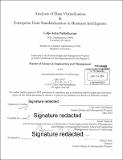| dc.contributor.advisor | Stuart Madnick. | en_US |
| dc.contributor.author | Pullokkaran, Laijo John | en_US |
| dc.contributor.other | System Design and Management Program. | en_US |
| dc.date.accessioned | 2014-10-08T15:23:49Z | |
| dc.date.available | 2014-10-08T15:23:49Z | |
| dc.date.copyright | 2013 | en_US |
| dc.date.issued | 2013 | en_US |
| dc.identifier.uri | http://hdl.handle.net/1721.1/90703 | |
| dc.description | Thesis: S.M. in Engineering and Management, Massachusetts Institute of Technology, Engineering Systems Division, System Design and Management Program, 2013. | en_US |
| dc.description | Cataloged from PDF version of thesis. | en_US |
| dc.description | Includes bibliographical references (page 59). | en_US |
| dc.description.abstract | Business Intelligence is an essential tool used by enterprises for strategic, tactical and operational decision making. Business Intelligence most often needs to correlate data from disparate data sources to derive insights. Unifying data from disparate data sources and providing a unifying view of data is generally known as data integration. Traditionally enterprises employed ETL and data warehouses for data integration. However in last few years a technology known as "Data Virtualization" has found some acceptance as an alternative data integration solution. "Data Virtualization" is a federated database termed as composite database by McLeod/Heimbigner's in 1985. Till few years back Data Virtualization weren't considered as an alternative for ETL but was rather thought of as a technology for niche integration challenges. In this paper we hypothesize that for many BI applications "data virtualization" is a better cost effective data integration strategy. We analyze the system architecture of "Data warehouse" and "Data Virtualization" solutions. We further employ System Dynamics Model to compare few key metrics like "Time to Market" and "Cost of "Data warehouse" and "Data Virtualization" solutions. We also look at the impact of "Enterprise Data Standardization" on data integration. | en_US |
| dc.description.statementofresponsibility | by Laijo John Pullokkaran. | en_US |
| dc.format.extent | 59 pages | en_US |
| dc.language.iso | eng | en_US |
| dc.publisher | Massachusetts Institute of Technology | en_US |
| dc.rights | M.I.T. theses are protected by copyright. They may be viewed from this source for any purpose, but reproduction or distribution in any format is prohibited without written permission. See provided URL for inquiries about permission. | en_US |
| dc.rights.uri | http://dspace.mit.edu/handle/1721.1/7582 | en_US |
| dc.subject | Engineering Systems Division. | en_US |
| dc.subject | System Design and Management Program. | en_US |
| dc.title | Analysis of data virtualization & enterprise data standardization in business intelligence | en_US |
| dc.title.alternative | Analysis of data virtualization and enterprise data standardization in business intelligence | en_US |
| dc.type | Thesis | en_US |
| dc.description.degree | S.M. in Engineering and Management | en_US |
| dc.contributor.department | System Design and Management Program. | en_US |
| dc.contributor.department | Massachusetts Institute of Technology. Engineering Systems Division | |
| dc.identifier.oclc | 890947872 | en_US |
